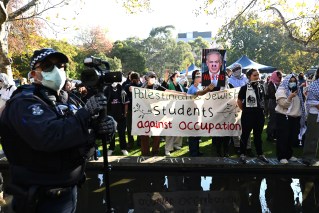Alan Kohler: Government is actively undermining the RBA on wages


The Coalition’s industrial relations omnibus bill will undo what the RBA wants to do, Alan Kohler says.
For much of 1998 I spent every day covering the great waterfront dispute, the last stand of Australian unionism.
It was exhausting and riveting but, with hindsight, I was witnessing an economic disaster.
The Howard government and Patrick Stevedores broke the Maritime Union, and began the process of breaking the whole union movement and workers’ bargaining power.
Now, 23 years later, their successors in the Coalition can’t stop doing it, even though this is now the opposite of what the country needs, according to the Reserve Bank and most economists.

Waterfront workers and union supporters march in front of Sydney’s Darling Harbour docks in April 1998, after Australia’s largest ship-loading company, Patrick, fired its 1400 workers overnight. Photo: AP
RBA governor Philip Lowe would be hoping that when Christian Porter returns to work from mental health leave, he forgets to bring his industrial relations bill with him.
The legislation actively, intentionally, undermines what Dr Lowe is trying to achieve.
It is one of two ways in which the federal government is trying to get wages growth down, both of them launched just after the RBA produced its big effort in November to get wages growth up.
The other one is a wages cut for Commonwealth public servants, unveiled by the Assistant Minister to the Prime Minister and Cabinet, Ben Morton, on November 13.
Mr Morton announced that the existing 2 per cent cap on wage increases for public servants would be removed and that future increases would be limited to those in the private sector, as measured by the ABS’s wage price index (WPI).
It was presented as a way for public servants to get pay rises of more than 2 per cent. Morton said that would happen when “private sector wage growth … eventually exceeds 2 per cent”, which is probably why it didn’t get much attention at the time.
But right now, the WPI is just 1.4 per cent, so the new policy is a cut from the previous 2 per cent.
It’s simple really: If the government was interested in helping the Reserve Bank it would increase public service wages. That would set a benchmark for the rest of the workforce.
The decision to cut them instead came 10 days after the RBA announced its historic set of measures designed to get wages growth up.
It cut the cash rate from 0.25 per cent to 0.1 per cent and launched quantitative easing for the first time by saying it would buy $100 billion worth of government bonds.
In the statement on November 3, supported by the first RBA press conference in living memory, Dr Lowe said: “Wage growth will have to be materially higher than it is currently”, for inflation to be sustainably within the 2-3 per cent target band.
He has repeated that every month since then.
The November 13 announcement about public sector wages was made in the clear knowledge of the RBA statement 10 days earlier, so it was a deliberate repudiation by the government of monetary policy.

RBA governor Philip Lowe wants to lift wages, not have them suppressed. Photo: Getty
As it happens, the ABC Four Corners program alleging sexism and inappropriate behaviour by Christian Porter and Alan Tudge was aired on November 9, so in the days and weeks after that, the Attorney-General did interviews and doorstops defending himself.
In many of them he also talked up his forthcoming industrial relations omnibus bill, steering the conversation back to policy issues. The bill was eventually unveiled exactly a month later on December 9.
He presented the bill as a series of improvements to the IR system: Simplifying awards, ending the confusion around the status of casual employees, boosting investment in “mega-projects” and simplifying the “better off overall test” (BOOT test) in awards and enterprise agreements (EAs), which says that new arrangements must always leave workers better off.
But the bill does far more than simplify and clarify.
It introduces a pathway for employers to cut unions out of enterprise agreements, which Porter claims will help increase the coverage of EAs from the current 11.7 per cent. In 2013 it was 19 per cent.
But non-union EAs almost always involve lower wages than deals involving unions, and this is why the government wants to cut out the unions.
The bill also reduces scrutiny by the Fair Work Commission so that lower-wage agreements can be approved more quickly.
The protections in the Fair Work Act are the last line of defence for employees who have been handed a pro forma contract and told to sign it.
The bill introduces a two-year exemption to the BOOT test, but it will effectively last longer than this because EAs typically keep going until they are renegotiated, which often takes years.
In effect, the government is destroying the safety net that says wages cannot be reduced in Australia.
And it launched this effort just a few weeks after the Reserve Bank began its own bid to get wages up, including helping to fund government spending by buying $100 billion worth of its debt.
Meanwhile in the United States, Amazon has embarked on an advertising blitz urging US Congress to follow its lead and raise the minimum wage from $US7.25 an hour to $US15. Amazon increased its minimum wage to $15 in 2018.
In a blog post, the company wrote: “As we take steps to recover from the devastating economic impact of the COVID-19 pandemic, America’s workers in need of a raise, small businesses that will benefit from increased spending and the country’s broader economic recovery simply can’t wait.”
Happily, Australia’s minimum wage is already $US15 an hour ($19.84), but the points about workers needing a raise, small business needing increased spending and the broader economic recovery needing higher wages apply just as much here.
Just ask the governor of the Reserve Bank.
Alan Kohler writes for The New Daily twice a week. He is editor in chief of Eureka Report and finance presenter on ABC News








